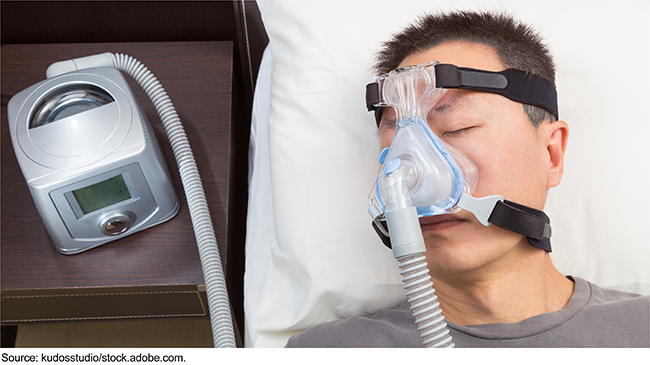VA Acquisition Management: Additional Actions Needed in Serving Veterans with Sleep Apnea
Fast Facts
Over the last 8 years, VA spent about $2 billion to provide CPAP devices to veterans with sleep apnea. The devices use air pressure to keep a person breathing normally while sleeping.
In 2021, VA changed the way it buys and distributes CPAPs—setting broad goals to spend less, improve customer service for veterans, and more. For example, it allows veterans to order CPAP supplies by phone, mail, and online.
But VA hasn't set clear and measurable performance targets, so it doesn't know how much these changes have helped or if more should be done. Feedback from stakeholders, including veterans, has been mixed.
Our recommendation addresses this.
Man using a CPAP device during sleep

Highlights
What GAO Found
To help veterans suffering from sleep apnea—a common condition that occurs when a sleeping person's airway becomes blocked—the Department of Veterans Affairs (VA) provides positive airway pressure (PAP) devices as a treatment. Approximately 1.4 million veterans received PAP devices from 2016–2023.
VA began an initiative to centralize the contracting and distribution of PAP devices and supplies to help address issues experienced in its prior approach. Before the initiative, VA medical centers ordered PAP devices through a decentralized system, leading to inconsistent supply availability, prices, and care for veterans. VA set goals for the centralized PAP distribution initiative including increased efficiency, reduced costs, and improved care for veterans.
Distribution Lines at the Department of Veterans Affairs Service and Distribution Center

VA made several changes to implement the initiative, such as awarding national contracts, updating two IT systems, renovating a warehouse and increasing staff, and revising the ordering process for devices and supplies. While implementing these changes, VA addressed challenges such as the recall of certain PAP devices by a major manufacturer in June 2021.
According to VA officials leading the initiative, they have yet to develop metrics to monitor performance because they are still dealing with issues that arose from the recall. One area where GAO found performance issues was the call center that veterans can contact for reordering PAP supplies. GAO's analysis of call center wait times from November 2022 through November 2023 found that 37 percent of calls were answered. However, 63 percent were unanswered because the caller hung up before reaching a representative. DLC officials stated that over half of these terminated calls were addressed through subsequent callback and services were provided to the caller. For veterans needing assistance, this could delay reordering of needed PAP supplies. Without establishing objectives and metrics to monitor the performance of the initiative, VA cannot track whether it is addressing the issues that prompted these changes, or whether it is meeting the needs of veterans who use PAP devices and supplies to treat their sleep apnea.
Why GAO Did This Study
Sleep apnea is a prevalent respiratory disability for which veterans receive benefits. VA spent approximately $2 billion acquiring sleep apnea care devices and supplies over the last 8 years. GAO added VA's acquisition management to its High-Risk Series in 2019 due to numerous challenges to efficiently purchasing goods and services.
GAO was asked to review VA's initiative to centralize the distribution of PAP devices. This report assesses (1) the basis for VA's decision to centralize the distribution of PAP devices and supplies; (2) changes VA made to implement the initiative; (3) challenges experienced in implementing the initiative; and (4) how VA monitors the initiative's performance.
To conduct this work, GAO made a site visit to the Service and Distribution Center where orders for PAP devices and supplies are filled and shipped, reviewed contract files and other program documentation, analyzed ordering system data, and interviewed VA officials and sleep medicine clinicians.
Recommendations
GAO is making one recommendation to VA, that it develop metrics and corresponding objectives to track performance of the centralized PAP distribution initiative.
Recommendations for Executive Action
| Agency Affected | Recommendation | Status |
|---|---|---|
| Department of Veterans Affairs | The Secretary of Veterans Affairs should ensure that the Prosthetic and Sensory Aids Service, in coordination with the National Acquisition Center and the National Sleep Medicine Office, develops a set of metrics and corresponding objectives to track initiative performance with appropriate, reliable data sources, and routinely shares this information with other relevant stakeholders. (Recommendation 1) |
In March 2025, officials from the Department of Veterans Affairs' Prosthetics and Sensory Aid Services, in coordination with the National Acquisition Center, and the National Sleep Medicine Office, developed a full set of metrics and corresponding objectives to track the performance of the PAP initiative. Officials also provided evidence that they routinely share the consolidated metrics on an internal platform to provide leadership visibility into the performance of the program.
|
